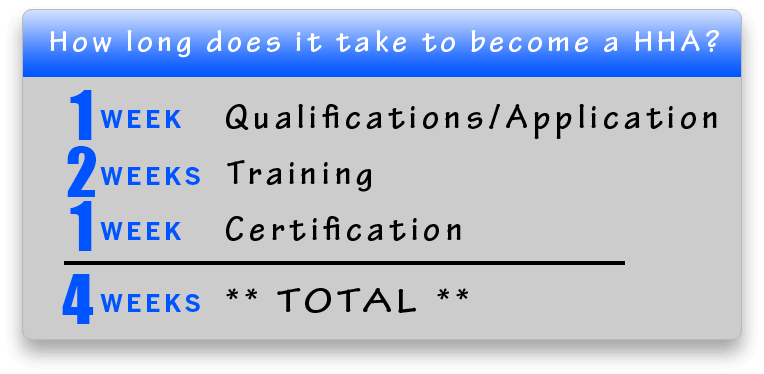50 Most Asked Questions About How To Be A Home Health Aide
Here are more than fifty (50) frequently asked questions (FAQ) about how to become a home health aide (HHA).
Sometimes a real quick answer will do the trick.

If you want to quickly get a job in the healthcare field then consider being a HHA as there are no formal education requirements. Besides, you can start working almost immediately while getting on-the-job training.
Below are frequently asked questions (FAQ’s) about this unique and fulfilling career in the healthcare field.
HHA Career
What does HHA stand for?
HHA is an abbreviation for a “home health aide”. They help patients in the home (most of the time) with personal care, light housekeeper, preparation of meals and monitor the patient’s condition.
What does a HHA do?
They assist the patient in the activities of daily living and provide basic routine care; such as assistance in eating, bathing, brushing teeth, assisting with medicine, changing dressing, checking a patient’s temperature and pulse rate, and helping with walking aids.
What are the requirements to be a HHA?
Typical minimal criteria to be a HHA:
- At least 18 years of age
- Able to read and write English above the 6th grade level
- Have a government issued photo identification – such as a driver’s license or passport
- Authorized to work in the United States
- Can prove that you are physically and mentally capable for a HHA job.
- Pass a pre-employment physical, toxicology (i.e. drug) screening, criminal background check and credit check.
How long does it take to become a home health aide?
In 4 – 6 weeks you can start your new home health aide (HHA) career.
Because there are very few requirements to become a HHA, many people find it to be a great way to enter the healthcare industry.
See How long does it take to become a HHA? 4 weeks!
How much do home health care aides make an hour?
Find out how much a HHA makes in your state!
Are there jobs available for HHA’s?
Yes. It is the third fasting growing occupation and expected to grow 47% from 2016 to 2026; unless you want to be in the two fastest growing jobs (i.e. solar panel installer and wind turbine technician) this job market is very hot.
Do I need to be certified to work as a HHA?
No. You need to be certified only if they work for an agency that gets reimbursed for Medicare/Medicaid; though being certified generally means you have more employment options and can make more money.
Do I need a GED to be a home health aide?
No, but some agencies require it.
Is there an age requirement to be a HHA?
Most employers require you to be at least 18 years of age.
What’s the difference between a CNA and HHA?
The biggest difference is that the CNA (certified nursing assistant) works in organizational healthcare settings like hospitals and nursing homes. The HHA almost works exclusively in the patient’s home.
Any other difference between a CNA and HHA?
Yes. CNA’s require a little more training and must be registered in their respective state’s nursing registry; requirements vary by state.
Is a criminal background check part of the HHA hiring process?
Yes, usually.
Since these workers routinely work unsupervised in private homes helping people who have varying degrees of disabilities, background checks are common. An aide who can’t pass such a check may have trouble finding a job.
Is a credit check part of the HHA hiring process?
In some cases home health care candidates must agree to a credit check to look for any history of bankruptcy or other financial problems. It’s possible that a candidate with very poor credit might not get hired due to concerns about her financial stability.
What makes a good HHA?
- Patience: you’ll have to stay calm and supportive while you help patients finish their tasks at their own speed; you cannot be rude or disrespectful to your patients.
- Detail-oriented: you must follow the instructions from the home healthcare team closely; tasks include accurately describing changes in a patient’s health status.
- Well-organized: staying organized will help your daily responsibilities run smoothly and gives your patients confidence that you are providing high quality care.
- Physical stamina: you’ll be taking care of patients throughout the day and even the night; you need to be fit and have the stamina to perform heavy lifting and lots of standing.
Will I need a car to work as a HHA?
You may be required to run errands and/or transport patients to medical appointments. Besides, you will have to actually need to see your client in person and public transportation may not always be available or the best solution. Each patient is different so ask upfront if having a car is mandatory. You don’t want any surprises on day one of your home health aide assignments.
What’s the profile of a home health aide?
More people should know the profile of a HHA as she (most are women) is very misunderstood. She is educated, speaks English and wants to advance in the healthcare sector.
Do I need to administer medicine to my patients as a HHA?
No, you can only remind the patient. You can also help them open medicine bottles or other containers. This varies by state and you will be informed during your training. (A home health aide may be able to give a diabetic insulin – in certain circumstances.)
How many patients will I have – I’m nervous I will be overwhelmed?
You will normally work with one patient at a time; but you may have many patients to see in a day. That’s a great thing about being a HHA – something new each day/week.
OK, I’m on the job as a HHA – am I “in-charge” of the patient?
No, not really. You take direction/guidance from a registered nurse (RN). She/he will outline a plan of action on the patient requirements and you will keep the RN up-to-date with your record keeping.
How do I become a HHA?
You need to successfully complete an approved training program and pass a home health aide competency exam within two (2) years of training.
HHA Training
What are the training requirements to be a HHA?
If you work for a Medicare-certified home health agency (most are) then you need to be trained and evaluated through training programs approved at the state level.
HHA training requirements: at least 75 hours of training, including at least 16 hours of supervised practical or clinical training and 12 hours of continuing education per each 12-month period.
How do I know the HHA training requirements for my state?
Good question. Many states require more than the federal minimums; some states require 120 hours, not 75 hours. Learn more here about state HHA requirements.
Why are HHA training requirements so confusing?
There’s no short answer. States are slow to adopt recommendations to make HHA training more uniform while also increasing the requirements. HHA’s need to be properly trained to address the many needs of patients.
Any example on what I’ll learn in training?
- communications skills
- reporting and documentation of patient status
- reading and recording temperature, pulse, and respiration
- elements of body functioning and changes in body function
- maintenance of a clean, safe, and healthy environment
- physical, emotional, and spiritual needs of the patient
- techniques in personal hygiene and grooming that include:
- transfer techniques and ambulation
More training information here.
I will be working on live patients during my HHA training?
Yes, it’s possible. Though for some skills a mannequin cannot be used: a volunteer or “pseudo-patient” must be used.
What does the HHA training consist of?
There will be classroom time and supervised practical training. The practical training is in the clinical setting where the trainee demonstrates knowledge while performing tasks on an individual.
See more here: In-depth syllabus for HHA training
What is supervised practical training?
Supervised practical training means training in a skills laboratory, patient’s home or other health care setting. You perform tasks on an individual under the direct supervision of an RN or approved instructor.
Does free HHA training exist?
Yes, definitely. Free HHA training exists through companies that employ home health aides (usually called agencies) and train you for certification as part of an employment agreement. Upon successful completion of the training and passing the exam you agree to work for the agency for a minimum of six months.
So, absolutely no costs or fees?
Not exactly. You may have to pay for a training manual but these usually don’t cost more than $80 and you’d have to pay to be registered in your state – that could be $40.
Why/how is it free?
Simple. Employers cannot keep up with the demand from home care workers. They’ve taken the training into their own hands in order to employ folks right away.
How can I qualify for free HHA training?
There are hundreds of state-approved HHA training program that will give you the education and experience you need for a successful career as a certified HHA.
You may qualify if:
- You can commit to about four weeks of training
- You’re able to work a 30 hour work week upon successful completion of the training
- You remain flexible to work days, evenings, and every other weekend
You successfully pass a pre-employment physical, toxicology (i.e. drug) screening, criminal background check and perhaps a credit check.
How can I find free HHA training near me?
Here are the four (4) easy steps to finding free HHA classes in your area:
- Search Local Agencies
- Take Notes
- Ask Key (!) Questions
- Start Applying
More ways to get free training.
Who performs the actual HHA training?
This must be done by or under the general supervision of a RN; she/he must have at least two (2) years of nursing experience; may vary by state.
After the training, how do I become a HHA?
You become and actual working HHA after you’ve successfully completed your training and you have passed a competency evaluation (often referred to as a test or exam).
HHA Test
Do I need to be “certified” as a HHA?
You only need to be certified if you will be working for a Medicaid and Medicare-certified home health agency; almost all agencies are certified will provide more jobs for you and allow you to make more money.
And if I don’t become certified?
You may work as a private-duty home health aide or work for a home health agency that accepts patients without getting reimbursed from Medicare/Medicaid
What is a “private-duty” HHA?
If you are being employed/hired directly by a family to take care of a family member then you would be a private-duty HHA (i.e. hired privately).
So, what is the HHA test?
To be certified a certified HHA you most likely will have to take a competency exam/test.
This will test your basic competencies of what you have learned in training.
What’s on the HHA test?
• communications skills
• reporting and documentation of patient status
• reading and recording temperature, pulse, and respiration
• elements of body functioning and changes in body function
• maintenance of a clean, safe, and healthy environment
• physical, emotional, and spiritual needs of the patient
• techniques in personal hygiene and grooming that include:
• transfer techniques and ambulation
What are the sections of the test?
Most HHA competency exams are in two (2) sections: Written and Skills. The Written section is 50 -100 multiple choice questions while the Skills testing is where you demonstrate basic skills such as helping a patient out of bed or taking vital signs, etc.
What’s an example of a Written section multiple-choice question?
When a client complains of pain, what should the health aide do first?
A. Ask the client to describe the pain.
B. Call the client’s doctor.
C. Offer the client a warm cup of milk.
D. Change the client’s position.
Correct answer is “A“
How about a Skills test demonstration example?
A patient is sitting at a table and unable to feed him/herself. You will have passed and graded as you handle this skill.
Is the HHA test difficult?
No, as long as you review your notes and resources from training you should be fine – but you do need to know the material.
How to I prepare for the HHA test?
You do not want any surprises on test day. Take as many practice tests as you can so you will know what the test looks like and the types of questions.
Where can I find practice tests (with answers)?
Here’s a great and FREE HHA practice test. Fifty (50) questions to give you a good feel what’s included on test day.
How long does it take to find out how I did on the test?
It usually takes about one (1) week after testing.
What if I don’t pass the first time?
Sorry, but you’ll be out time and money. Most states will charge you again to take the test – pass the test on the first try and you will relieve lots of unneeded stress.
Do I have to pay again to retake the exam?
If you fail the Written or Skills section a new fee is required each time you re-take any part of the exam.
How many times can I retake the HHA exam?
You usually are allowed you three (3) attempts to pass both section of the exam. If you fail the HHA test three (3) times, then chances are you will need to successfully complete your training again.
What happens after I pass the HHA competency exam?
Congratulations! Once you have passed both sections of the HHA test you need to apply to your state Board of Nursing for certification as a HHA. Once your application has been approved, you will receive a copy of the certification, you will be in their online database and your employer will have a copy as well.
Applying to officially get certified sounds difficult and confusing?
Not really. The company, school or home health agency that administered your training will do all the paperwork for you. They want you to succeed.


